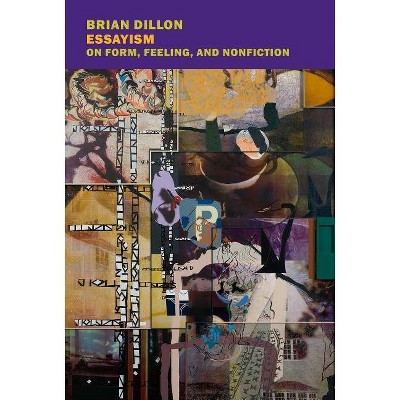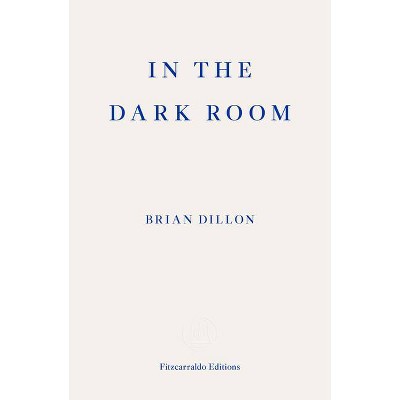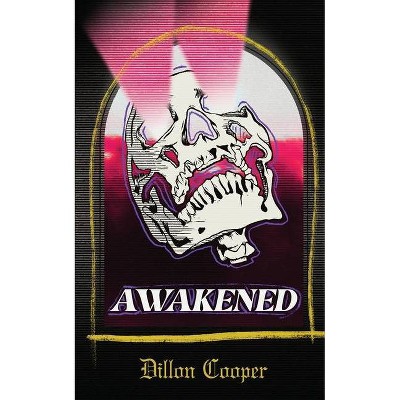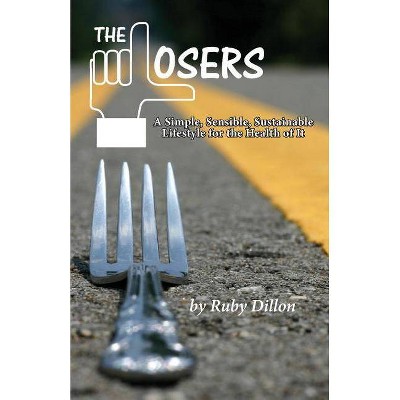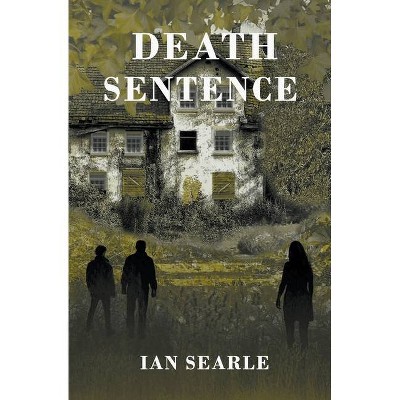Suppose a Sentence - by Brian Dillon (Paperback)
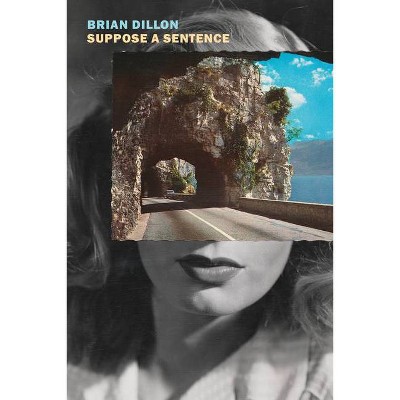
Similar Products
Products of same category from the store
AllProduct info
<p/><br></br><p><b> About the Book </b></p></br></br>"This is a New York Review book"--Copyright page.<p/><br></br><p><b> Book Synopsis </b></p></br></br><b><b>A captivating meditation on the power of the sentence by the author of <i>Essayism</i>, a 2018 <i>New Yorker</i> book of the year</b>.</b> <p/>In <i>Suppose a Sentenc</i>e, Brian Dillon, whom John Banville has called "a literary flâneur in the tradition of Baudelaire and Walter Benjamin," has written a sequel of sorts to <i>Essayism</i>, turning his attention to the oblique and complex pleasures of the sentence. A series of essays prompted by a single sentence--from Shakespeare to James Baldwin, John Ruskin to Joan Didion--this new book explores style, voice, and language, along with the subjectivity of reading. Both an exercise in practical criticism and a set of experiments or challenges, <i>Suppose a Sentence</i> is a polemical and personal reflection on the art of the sentence in literature.<p/><br></br><p><b> Review Quotes </b></p></br></br><br>"Marvelous. . . . [Dillon] is no slouch himself at crafting a phrase. . . . The product of decades of close reading, <i>Suppose a Sentence</i> is eclectic yet tightly shaped. Mr. Dillon has a taste for the more eccentric prose stylists, and lights with delight upon the likes of John Ruskin, who 'insisted he knew perfectly well if, or when, he had lost his mind.' His essay on Thomas De Quincey is a small masterpiece. . . . Mr. Dillon's book is a record of successive enrapturings." --John Banville, <i>The Wall Street Journal</i> <p/>"[A] record of appreciation, a rare treasure in an age that rewards bashing. . . . Dillon's affinities prove eclectic and unexpected. He knows some authors, among them Roland Barthes, exhaustively. Others, like the jazz critic Whitney Balliett, he admits he has just discovered. He admires James Baldwin, Maeve Brennan and Annie Dillard. Best of all, he loves writers who craft sentences crooked with clauses, like Thomas Browne and Thomas De Quincey. . . . Dillon writes similarly digressive sentences. <i>Suppose a Sentence</i> has many rewards, but its greatest gift is its exuberant style." --Becca Rothfield, <i>The New York Times Book Review <p/></i>"... Dillon demonstrates that reading out of love, lingering over cherished sentences, can draw out an astonishing wealth of material. These sentences are like old friends, with the constant ability to still surprise, even after many years of knowing them."<i><br>-- </i>Katie da Cunha Lewin, <i> <i>LA Review of Books <p/></i>"</i>. . . I love that Brian Dillon love things and then writes about the things that he loves so we can love them too, . . . and maybe that starts with filling up some notebooks with sentences that feel special . . . . <i>Suppose a Sentence</i> is a masterful, meticulous book, at the core of which is Dillon thoughtfully telling me, a sometime-skeptic, why these sentences are very gorgeous t<i>o </i>him<i>." --</i>Sophia Stewart, <i>Blog LA Review of Books <p/></i>Dillon's erudition and enthusiasm is so infectious that you want to read everything he describes, making this the perfect book to kick off a long lockdown winter." --Olivia Laing, <i>The Guardian </i>"Best Books of 2020" <p/>"<i>Suppose a Sentence</i> is an absorbing defence of literary originality and interpretation, inviting us not just to take words as they first appear but to let them abstract themselves before our very eyes." --Chris Allnutt, <i> Financial Times</i> <p/>"In this delightful literary ramble, Dillon (<i>Essayism</i>), a creative writing professor at Queen Mary University of London, expounds upon remarkable sentences from a variety of voices in literature, past and present. . . . The well-chosen sentences themselves are worth the price of admission, but Dillon's encyclopedic erudition and infectious joy in a skillful piece of writing are what stamp this as a treat for literary buffs." --<i>Publishers Weekly</i> <p/>"These chronologically arranged picks from the 17th century to today are the 'few that shine more brightly and for the moment compose a pattern.' The author plumbs biography, autobiography, and history to add context and background, with particular attention to each author's literary style. . . . A learned, spirited foray into what makes a sentence tick." --<i>Kirkus Reviews</i> <p/>"The book has a lot of what I can only call pleasure--of the kind that I imagine athletes or dancers experience when they are doing what they do, which is then communicated to those watching them do it. . . . [D]elight is evident both in the sentences Dillon looks at and in those he writes himself." --Hasan Altaf, <i>The Paris Review<br></i><br>"Dillon's writing plays an exquisite critical sensibility against an exuberant celebratory impulse. He homes in on particular formal decisions (why this comma here rather than there) and he makes it clear why he loves the sentences he does. . . . Like his favorite sentences, Dillon's essays 'keep it together, ' just barely, and they're all the more stylish for it." --Anthony Domestico, <i>Commonweal</i> <p/>"Taking as his starting point a sentence that has intrigued him for years or, in some cases, come into his ken more recently, Brian Dillon in <i>Suppose a Sentence</i> ranges through the centuries exploring the associations of what he observes and discovers about his object of study and its writer, through biographical anecdote, linguistic speculation, and a look at related writings. This rich and various collection resembles a beguiling, inspiriting conversation with a personable and wry intelligence who keeps you happily up late by the fireside, incites you to note some follow-up reading, and opens your eyes further to the multifarious syntactical and emotional capacities of even a few words of English. Enjoyable and thought-provoking reading!" --Lydia Davis <p/>"Brian Dillon is one of the true treasures of contemporary literature--a critic and essayist of unmatched style, sensitivity and purpose--and <i>Suppose a Sentence</i> is a book only he could have written. It's an inspired celebration of the sentence as a self-sufficient art form, and reading it has reinvigorated my sense of the possibilities of writing itself." --Mark O'Connell <p/>"Dillon has brilliantly reinvented the commonplace book in this witty, erudite, and addictively readable guide to the sentences that have stayed with him over the years." --Jenny Offill<i> <p/></i>"Brian Dillon has a way with and among ideas, rather an unusual one. His acute noticing supposes, as he says along with Gertrude Stein, a singular sentence in some text of these wildly differing authors, and then expands upon that notice, moving us around within and without the very particular wording to the everything else around. He dives in for some detail(s) of each called upon part of a whole, surprising us and himself by his swerves and metaswerves, offering them delightedly up to a joint self-awareness in the reading. Very close-up and personal, the style wrapping around itself, like the Ouroboros, this animal waiting to be found." --Mary Ann Caws, author of <i>Creative Gatherings: Meeting Places of Modernism<br></i><br>"Sentences are paths. They track routes through time and place, relating in their wake previously unrelated subjects, feelings, questions and ideas. They open and rhythm the durational spaces they move through and as we read them they move us: we move, too. Reading Brian Dillon's brilliant book, I was repeatedly struck--because each one of the book's short sections is a wholly captivating demonstration of this fact--that a sentence, just a single sentence, can hold and release an event. The practice Dillon is engaged in here could be called 'close reading' as in his previous book <i>Essayism</i>, what is at stake is how what is narrowly called the English language works, how it can be set to work and how these collaborative workings matter, especially when what they are doing is difficult, strange, freeing or beautiful. But, as in <i>Essayism</i>, there is also more to it. 'Close reading, ' in Dillon's hands, starts to look like a form of 'close living' a life practice that makes an everyday value out of paying serious, open-minded attention, especially to what is hard to understand." --Kate Briggs<i><br></i><br>"Dillon is a mournful, witty and original writer." --Parul Sehgal, <i>The New York Times</i> <p/>"One of our most innovative and elegant nonfictioneers." --Robert Macfarlane, author of <i>Underland</i><br><p/><br></br><p><b> About the Author </b></p></br></br><b>Brian Dillon</b> was born in Dublin in 1969. His books include <i>Essayism</i>, <i>The Great Explosion</i> (shortlisted for the Ondaatje Prize), <i>Objects in This Mirror</i>, <i>I Am Sitting in a Room</i>, <i>Sanctuary</i>, <i>Tormented Hope: Nine Hypochondriac Lives</i> (shortlisted for the Wellcome Book Prize), and <i>In the Dark Room</i>, which won the Irish Book Award for nonfiction. His writing has appeared in <i>The Guardian</i>, <i>The New York Times</i>, <i>London Review of Books</i>, <i>The Times Literary Supplement</i>, <i>Bookforum</i>, <i>frieze</i>, and <i>Artforum</i>. He is the UK editor of <i>Cabinet </i>magazine and teaches creative writing at Queen Mary University of London.
Price History
Cheapest price in the interval: 17.89 on November 6, 2021
Most expensive price in the interval: 17.99 on October 27, 2021
Price Archive shows prices from various stores, lets you see history and find the cheapest. There is no actual sale on the website. For all support, inquiry and suggestion messages communication@pricearchive.us
